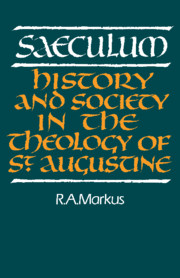Book contents
- Frontmatter
- Contents
- Introduction to the revised edition
- Preface
- Abbreviations
- 1 History: sacred and secular
- 2 Tempora Christiana: Augustine's historical experience
- 3 Civitas terrena: the secularisation of Roman history
- 4 Ordinata est res publica: the foundations of political authority
- 5 Afer scribens Afris: the Church in Augustine and the African tradition
- 6 Coge intrare: the Church and political power
- 7 Civitas peregrina: signposts
- Appendixes
- Bibliographical note
- List of works referred to
- Index
6 - Coge intrare: the Church and political power
Published online by Cambridge University Press: 26 October 2009
- Frontmatter
- Contents
- Introduction to the revised edition
- Preface
- Abbreviations
- 1 History: sacred and secular
- 2 Tempora Christiana: Augustine's historical experience
- 3 Civitas terrena: the secularisation of Roman history
- 4 Ordinata est res publica: the foundations of political authority
- 5 Afer scribens Afris: the Church in Augustine and the African tradition
- 6 Coge intrare: the Church and political power
- 7 Civitas peregrina: signposts
- Appendixes
- Bibliographical note
- List of works referred to
- Index
Summary
To reconstruct the mind of a writer from his works is an activity in some ways very like formulating a hypothesis, working out its implications, and testing it by continual reference back to the texts. So far this procedure in the first five chapters of this study has yielded a remarkably consistent reconstruction of Augustine's reflection on history, society and the Church. The strands of his thought on these related subjects, always closely interwoven, produced a single, coherent body as it matured. At the risk of representing Augustine as a precursor of modern ‘secularist’ theology, it is not out of place to describe his mature thought in this sphere as a synthesis of three themes: first, the secularisation of history, in the sense that all history outside the scriptural canon was seen as homogeneous and, in terms of ultimate significance, ambivalent (Chapters 1 and 2); second, the secularisation of the Roman Empire (Chapters 2 and 3) and of the state and social institutions in general, in the sense that they had no immediate relation to ultimate purposes (Chapters 3 and 4); third, the secularisation of the Church in the sense that its social existence was conceived in sharp antithesis to an ‘otherworldly’ Church such as was envisaged by a theology of the Donatist type (Chapter 5). These three strands together constitute what we may call a theology of the saeculum. The saeculum for Augustine was the sphere of temporal realities in which the two ‘cities’ share an interest.
- Type
- Chapter
- Information
- SaeculumHistory and Society in the Theology of St Augustine, pp. 133 - 153Publisher: Cambridge University PressPrint publication year: 1989



